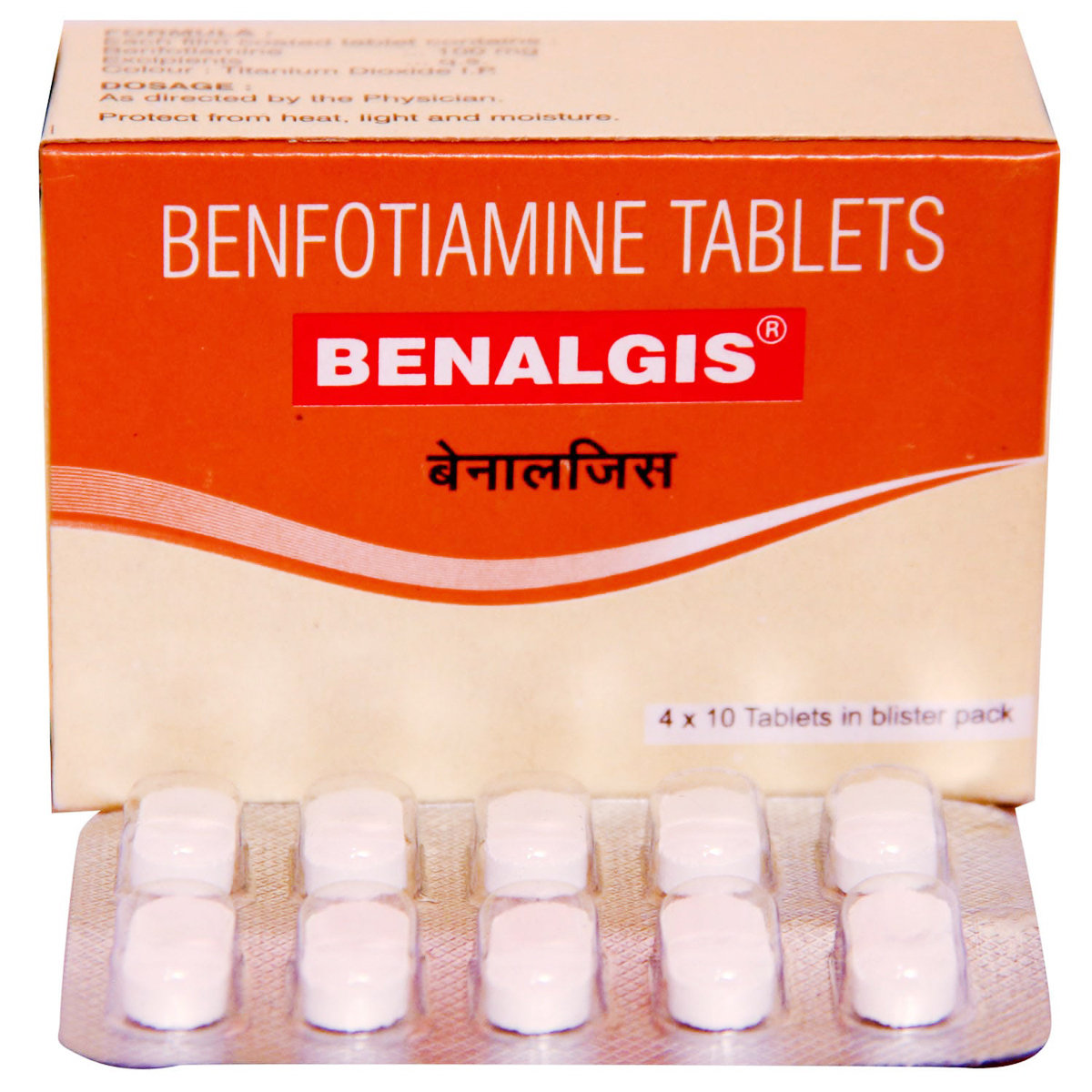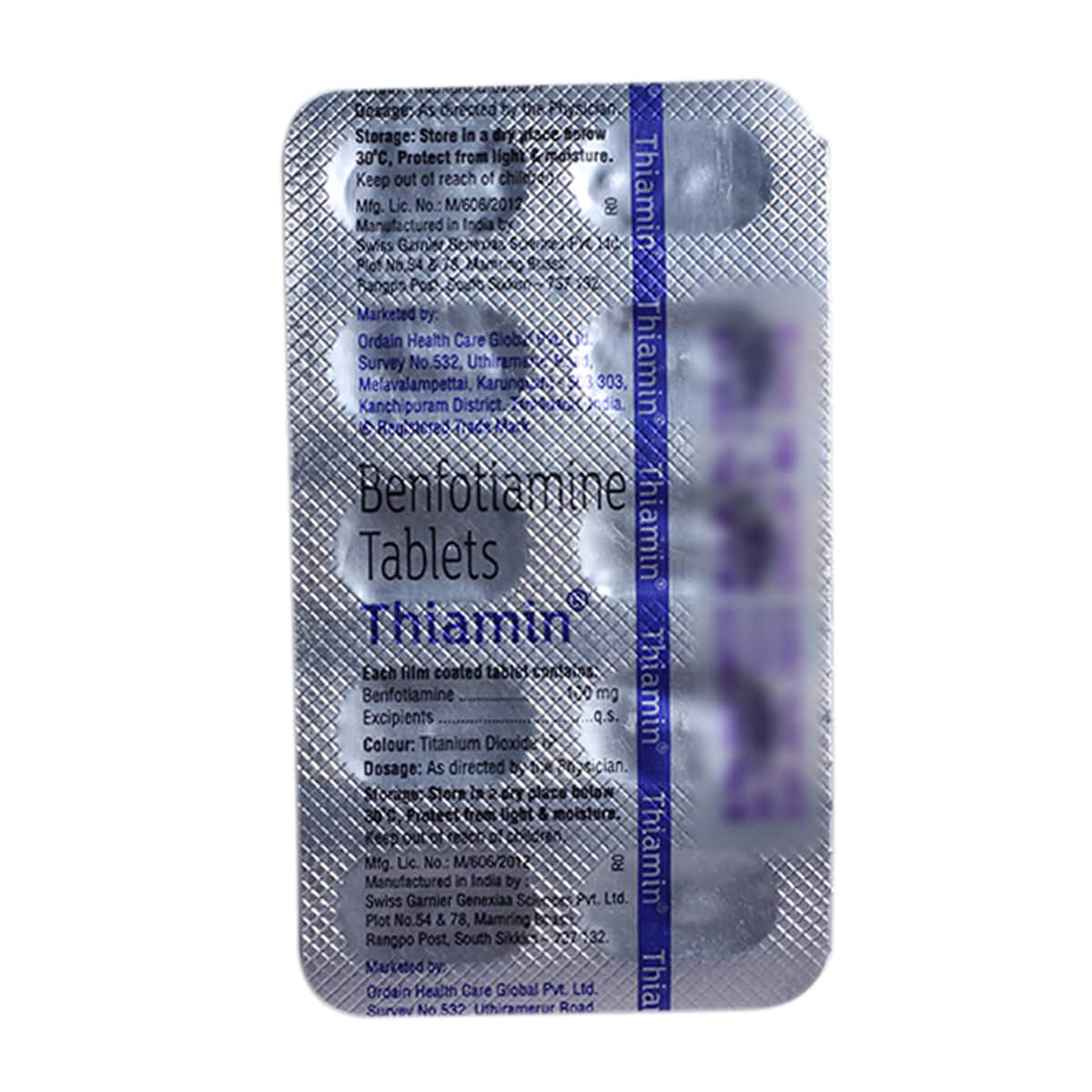- Home
- Thiamin Tablet
Thiamin Tablet Substitute
Thiamin Tablet Substitute
Medicine Composition:
BENFOTIAMINE-100MGAll Substitutes & Brand Comparisons
RX
Benthyme 100 mg Tablet 10's
McRiyavin Bio Research
₹75.5
(₹6.8 per unit)
50% CHEAPERRX
Bentex Tablet 10's
Theo Pharma Pvt Ltd
₹82.5
(₹7.43 per unit)
46% CHEAPERRX
B-One Plus Tablet 10's
Pharma Fabrikon
₹88
(₹7.92 per unit)
42% CHEAPERRX
Out of StockBenfo 100 mg Tablet 10's
Riya Health Care Pvt Ltd
₹105
(₹10.5 per unit)
24% CHEAPERRX
Out of StockBenatec 100 Tablet 10's
Tripada Healthcare Pvt Ltd
₹120
(₹10.8 per unit)
22% CHEAPERRX
Out of StockNulimit-100 Tablet 10's
East West Pharma India Pvt Ltd
₹114.4
(₹11.44 per unit)
17% CHEAPERRX
Benalgis 100 Tablet 10's
Franco Indian Pharmaceuticals Pvt Ltd
₹130
(₹11.7 per unit)
15% CHEAPERRX
Out of StockThiamin Tablet
Ordain Health Care Global Pvt Ltd
₹206
(₹12.36 per unit)
10% CHEAPERRX
Thiamin 100 mg Tablet 10's
Exeltis Healthcare Global
₹193
(₹17.37 per unit)
25% COSTLIERRX
Benfochem Tablet 10's
Lupichem Healthcare
₹843.5
(₹84.35 per unit)
508% COSTLIER

When Should You Consider Switching from Thiamin Tablet ?
Patients may explore substitutes in the following scenarios:
- High monthly cost of Thiamin Tablet
- Non-availability in local pharmacies
- Generic recommendation by a doctor
- Side effects or better tolerability with alternatives
What to Know Before Switching
Before you switch from Thiamin Tablet to another medicine, here are some important points to keep in mind:
Same salt, different brands:
Most substitutes contain the same active ingredient - BENFOTIAMINE-100MG, but the fillers, coating, or manufacturing quality may vary slightly.
Consult your doctor first:
Even if the salt is the same, your doctor can confirm if the substitute is right for your condition, dosage, and health history.
Watch out for allergies or reactions:
Some people may react differently to certain brands due to inactive ingredients. If you notice any side effects, inform your doctor immediately.
Price ≠ effectiveness:
A lower-priced substitute doesn't mean it's less effective. Many generic medicines work just as well as branded ones.
Check the dosage form and strength:
Always match the substitute’s strength (e.g., 5mg, 10mg) and form (tablet, capsule, syrup) with what your doctor prescribed.
Uses
Thiamin Tablet is used in the treatment of Vitamin B1 deficiency, beriberi disease, diabetic neuropathy and alcohol dependence. The detailed uses of Thiamin Tablet are as follows:
- Energy Metabolism: Thiamin Tablet plays an essential role in converting carbohydrates into energy, making it particularly vital for athletes and individuals engaged in energy-demanding activities.
- Nerve Function: Thiamin Tablet supports healthy nerve cells and is frequently utilised in the treatment of neuropathies and other nerve-related disorders.
- Cardiovascular Health: Thiamin Tablet is crucial for heart health, ensuring proper cardiac function and metabolic processes within heart cells.
- Preventing Neurological Disorders: Thiamin Tablet is commonly suggested to individuals with alcohol dependence to prevent conditions like Wernicke-Korsakoff syndrome, a severe neurological disorder.
- Digestive Health: Thiamin Tablet promotes the production of essential enzymes, aiding digestion, improving appetite, and supporting better digestion.
Medicinal Benefits
- Thiamin Tablet contains Benfotiamine, which is used to treat and prevent vitamin B1 deficiency.
- It is a lab-made version of vitamin B1, also called thiamine.
- Thiamin Tablet is a dietary supplement that improves mental health symptoms in people addicted to alcoholism and pain caused by diabetic neuropathy (nerve damage due to diabetes).
- Thiamine is used to treat beriberi, a condition caused by prolonged vitamin B1 deficiency.
- The body turns benfotiamine into thiamine. Thiamine helps deliver essential nutrients to nerves.
- Thiamin Tablet may also improve symptoms of Alzheimer's disease and arthritis. However, there is no scientific evidence to support these uses.
FAQs
The substitutes of Thiamin Tablet contain the same active salt(s) - BENFOTIAMINE-100MG. However, they may differ in price, manufacturing quality, and inactive ingredients. Speak to your doctor to find a suitable option.
Switching to a generic substitute medicine in the place of Thiamin Tablet is often possible if it has the same salt, strength, and dosage form. But always check with your doctor before making any changes to your medication.
Generics versions of Thiamin Tablet are typically more affordable because they don’t include the original brand's research, development, and marketing costs. They contain the same active ingredient and are approved for safety and effectiveness.
Most people don’t notice any difference. However, some may react to different fillers or coatings. If you notice any unusual symptoms after switching, consult your doctor.
Make sure the new medicine has the same active salt, strength, dosage form. Always confirm the change with your doctor or pharmacist.
Substitutes of Thiamin Tablet meet the same safety and efficacy standards as Thiamin Tablet , but small differences in absorption or formulation can exist. A doctor can help you choose the right one for your needs.
Yes. Substitutes of Thiamin Tablet may vary in color, size, or shape due to differences in manufacturing and branding, but this does not affect how they work.
Yes, it’s generally safe to switch between multiple substitutes of Thiamin Tablet if they have the same salt and strength. However, always inform your doctor so they can monitor how your body responds.
Yes, many people safely use substitutes of Thiamin Tablet for long-term treatment. Just ensure it’s done under medical supervision.
If your symptoms stay under control or lab results remain stable, the substitute for Thiamin Tablet is likely working well. Regular follow-ups with your doctor are important.
Absolutely. Even with the same salt, small differences can affect how your body responds when switching from Thiamin Tablet to its substitute. Always consult your doctor before switching.
Thiamin Tablet is used to treat Vitamin B1 deficiency, beriberi disease, diabetic neuropathy and alcohol use disorder.
Thiamin Tablet is a dietary supplement and contains Benfotiamine. It is a lab-made version of vitamin B1, also called thiamine. The body turns benfotiamine into thiamine. Thiamine helps deliver essential nutrients to nerves and treats vitamin B1 deficiency and beriberi.
Vitamin B1 deficiency occurs when your body does not have adequate levels of Vitamin B1 or Thiamine. This deficiency is commonly found in alcoholics, people with poor diets and those with malabsorption conditions. It is also common in children with congenital heart disease. People undergoing dialysis may also develop vitamin B1 deficiency.
Thiamin Tablet is safe to use during diabetic conditions since it shows positive effects on conditions caused by low blood sugar levels. Your doctor will advise on how you should use Thiamin Tablet if you have diabetes.
Thiamin Tablet does not usually cause any allergies. However, if you notice any side effects like a skin rash, please consult your doctor. Also, some Vitamin B1 tablets may contain components like lactose monohydrate. If you are lactose intolerant, let your doctor know.
Thiamin Tablet (Benfotiamine) and Thiamine (Vitamin B1) are closely related but not identical. Thiamin Tablet is a lipid-soluble derivative of Thiamine, designed to enhance absorption and bioavailability. While Thiamine is the natural, water-soluble form of Vitamin B1, Thiamin Tablet is mainly used to address specific health concerns, such as vitamin B1 deficiency, diabetic neuropathy, and alcoholism-related nerve damage.
Thiamin Tablet is a vitamin supplement used to treat and prevent Vitamin B1 deficiency, including conditions like alcoholism-related nerve damage, and diabetic neuropathy. It's also effective in managing mental health symptoms and preventing Beriberi disease. Benfotiamine converts to thiamine in the body, delivering essential nutrients to nerves.
Thiamin Tablet may cause weight gain in some cases, but not everyone who takes it will experience it. A healthy lifestyle, including a balanced diet and regular exercise, can help minimise the risk of weight gain.
Thiamin Tablet is generally considered safe, but like any supplement, it can cause some side effects in a few cases. Possible side effects may include skin rash, nausea, stomach discomfort, diarrhoea, hair loss, weight gain, body odour, and a decrease in blood pressure. Please note that these side effects are relatively rare and do not affect everyone who takes it. If you experience any persistent or worsening side effects, it's essential to consult your doctor for guidance.
Buy best Health & Nutrition products by
SPECIALITY SUPPLEMENTS
Minerals
VITAMINS AND MINERALS
VITAMINS
ADULT NUTRITION
OTHER SUPPLEMENTS
Protein Supplements
OMEGA & FISH OIL
WEIGHT LOSS
KIDS NUTRITION
SEXUAL HEALTH SUPPLEMENTS
BONE & JOINT SUPPLEMENTS
AMINO ACIDS
WELLNESS DRINKS
WEIGHT GAIN
WOMEN HEALTH SUPPLEMENTS
SINGLE VITAMIN
HEALTH FOODS
IMMUNE HEALTH SUPPLEMENTS
MULTIVITAMINS
CARDIAC SUPPLEMENTS
GASTRIC DISORDERS SUPPLEMENTS
WEIGHT LOSS AND WEIGHT GAIN
Vlado Sky Enterprise Pvt Ltd
Sun Pharmaceutical Industries Ltd
Intas Pharmaceuticals Ltd
Abbott India Ltd
Macleods Pharmaceuticals Ltd
Alkem Laboratories Ltd
Mankind Pharma Pvt Ltd
West Coast Pharmaceuticals Pvt Ltd
Emcure Pharmaceuticals Ltd
Lupin Ltd
Meyer Organics Pvt Ltd
Eris Life Sciences Ltd
Nutritionalab Pvt Ltd
Akumentis Healthcare Ltd
Torrent Pharmaceuticals Ltd
Cipla Ltd
Alniche Life Sciences Pvt Ltd
British Biologicals
La Renon Healthcare Pvt Ltd
Micro Labs Ltd
Leeford Healthcare Ltd
Zuventus Healthcare Ltd
Pharmed Ltd
Corona Remedies Pvt Ltd
Dr Reddy's Laboratories Ltd
East West Pharma India Pvt Ltd
Modi Mundipharma Pvt Ltd
Bright Lifecare Pvt Ltd
ABBOTT HEALTHCARE PVT LTD
Koye Pharmaceuticals Pvt Ltd
Apex Laboratories Pvt Ltd
Aristo Pharmaceuticals Pvt Ltd
Indchemie Health Specialities Pvt Ltd
Zydus Healthcare Ltd
DR Johns Lab Pharma Pvt Ltd
Bioceutics Inc
Hindustan Unilever Ltd
Vasu Organics Pvt Ltd
Fourrts India Laboratories Pvt Ltd
Zydus Cadila
Alembic Pharmaceuticals Ltd
USV Pvt Ltd
Elder Pharmaceuticals Ltd
ZYDUS WELLNESS LIMITED
FDC Ltd
Herbs Nutriproducts Pvt Ltd
Morepen Laboratories Ltd
Guardian Healthcare Services Pvt Ltd
Indoco Remedies Ltd
Zee Laboratories Ltd
TTK Healthcare Ltd
Troikaa Pharmaceuticals Ltd
Pulse Pharmaceuticals
Raptakos Brett & Co Ltd
Innovcare Life Sciences Pvt Ltd
Levin Life Sciences Pvt Ltd
Cadila Pharmaceuticals Ltd
Glanbia Performance Nutrition India Pvt Ltd
Linux Laboratories Pvt Ltd
Ajanta Pharma Ltd
Primus Remedies Pvt Ltd
Wockhardt Ltd
Medley Pharmaceuticals Ltd
Sanofi India Ltd
Wanbury Ltd
Adonis Laboratories Pvt Ltd
Hexagon Nutrition Pvt Ltd
Kepler Healthcare Pvt Ltd
Tablets India Ltd
Tas Med India Pvt Ltd
Aareen Healthcare Pvt Ltd
Cadila Healthcare Ltd
Medishri Healthcare Pvt Ltd
Overseas Health Care Pvt Ltd
Radicool Pharmaceuticals Pvt Ltd
Sanatra Healthcare Ltd
Daris Biocare
Elbrit Life Sciences Pvt Ltd
Maxamus Pharma Pvt Ltd
Ordain Health Care Global Pvt Ltd
Panacea Biotec Ltd
Procter & Gamble Health Ltd
Anglo French Drugs & Industries Ltd
Icarus Health Care Pvt Ltd
Nutricia International Pvt Ltd
Patanjali Ayurved Limited
Biovitamins Pvt Ltd
Klm Laboratories Pvt Ltd
Mova Pharmaceutical Pvt Ltd
Ozone Pharmaceuticals Ltd
Signova Pharma
Cachet Pharmaceuticals Pvt Ltd
Med Manor Organics Pvt Ltd
Akesiss Pharma Pvt Ltd
Delcure Life Sciences Ltd
Femura Pharmaceuticals Pvt Ltd
Hs Aldem Healthcare
Ipca Laboratories Ltd
Lincoln Pharmaceuticals Ltd
Lloyd Healthcare Pvt Ltd
SPECIALITY SUPPLEMENT
CALCIUM
Specialty Supplements
VITAMIN D
IRON
VITAMIN B12
VITAMIN B
VITAMIN C
COLLAGEN
FISH OIL OMEGA
Adult Nutrition Drink
MULTIVITAMIN
ZINC
VITAMIN B9
VITAMIN E
Kids Nutrition Drink
WHEY PROTEIN
SEXUAL HEALTH SUPPLEMENT
MAGNESIUM
SPECIALITY NUTRITION DRINK
Protein Powder
VITAMIN B1
SUGAR SUBSTITUTE
Prebiotic & Probiotic
DIABETIC NUTRITION DRINK
Protein Bar
BIOTIN
WEIGHT LOSS
ENERGY DRINK
Fat Burner
PLANT PROTEIN POWDER
WOMEN & MOTHER NUTRITION DRINK
Apple Cider Vinegar
MELATONIN
Lactation Supplements
APPETITE STIMULANT
Flax seed Oil
VITAMIN A
ORS
AMINO ACID
Pregnancy Supplements
Ashwagandha
Meal Replacement
POTASSIUM
Pre Workout
Shilajit
VITAMIN B6
L-Carnitine
VITAMIN K
CURCUMIN
Mass Gainer
CREATINE
Cod Liver Oil
Ayurvedic Capsules
VITAMIN B5
ARGININE
Glutathione
VITAMIN B2
COENZYME Q10
Chromium
Women Nutrition
MILK THISTLE
VITAMIN B3
Appetite Suppressant
Ayurvedic Tablets
Chyawanprash
Kids Gummies
MORINGA
L-Glutamine
SPIRULINA
GARCINIA CAMBOGIA
HERBAL JUICE
Instant Food
WEIGHT GAINER
ALPHA-LIPOIC ACID
DISKETTE
GLUCOSAMINE
GOKSHURA
Tulsi
ANTACID
BCAA Protein Powder
Brahmi
Chocolate
GILOY
NEEM
NUTRITION DRINK
SELENIUM
TRIPHALA
Amla
BREAKFAST CEREAL
GREEN TEA
Honey
IMF STAGE-2
MILKSHAKE
PAIN RELIEF TABLET




